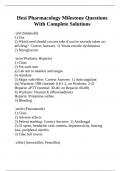Hesi Pharmacology Milestone Questions
With Complete Solutions
-afil (Sildenafil)
1) Use
2) Which med should you not take if you've recently taken an -
afil drug? Correct Answers 1) Treats erectile dysfunction
2) Nitroglyercin
-arin (Warfarin, Heparin)
1) Class
2) For each one:
a) Lab test to monitor and ranges
b) Antidote
3) Major side effect Correct Answers 1) Anticoagulant
2a) Warfarin: INR (normal: 0.8-1.2, on Warfarin: 2-3)
Heparin: aPTT (normal: 30-40, on Heparin: 60-80)
b) Warfarin: Vitamin K (Phytonadione)
Heparin: Protamine sulfate
3) Bleeding
-azole (Flucanazole)
1) Class
2) Adverse effects
3) Patient teaching Correct Answers 1) Antifungal
2) GI upset, headache, rash, anemia, hepatotoxicity, hearing
loss, peripheral neuritis
3) Take full course
-cillin (Amoxicillin, Penicillin)
,1) Class
2) Adverse effects
3) Patient teaching
4) Biggest adverse effect is anaphylaxis - how long after
administration should you watch your patient? Correct Answers
1) Penicillin
2) GI upset, furry tongue, sore mouth, superinfection,
hypersensitivity reaction
3) Take full course
4) 30 min
-cycline (Doxycycline)
1) Class
2) Adverse effects
3) Patient teaching Correct Answers 1) Tetracycline
2) GI upset, hepatotoxicity, teeth staining (avoid in children
under 8), bone damage, superinfection, rash, photosensitivity
hypersensitivity reaction
3) Take full course
-dipine (Amlodipine), Diltiazem, Verapamil
1) Class
2) Use
3) Side effects
4) Interventions Correct Answers 1) Calcium channel blocker
2) Angina, dysrhythmias, HTN
3) Bradycardia, hypotension, reflex tachycardia, headache,
dizziness, peripheral edema, constipation, flushing
4) Monitor VS, monitor LFTs and KFTs
-floxacin (Ciprofloxacin)
,1) Class
2) Adverse effects
3) Patient teaching Correct Answers 1) Fluoroquinolone
2) Headache, dizziness, insomnia, depression, GI upset, bone
marrow depression, fever, rash, photosensitivity, Achilles
tendon rupture
3) Take full course
-lol (Metoprolol, Atenolol)
1) Class
2) Use
3) Side effects
4) Patient teaching Correct Answers 1) Beta blockers
2) Angina, dysrhythmias, HTN, migraines, prevention of MI,
glaucoma
3) Bradycardia, bronchospasm, hypotension, weakness, fatigue,
hyperglycemia
4) Hold med if BP or HR is low, assess for resp distress, may
mask signs of hypoglycemia (monitor BG level), avoid nasal
decongestants
-mycin, -micin, -cin (Vancomycin, Gentamicin, Amikacin)
1) Class
2) Adverse effects
3) Patient teaching
4) Interventions
5) Med is usually given IV. What infection is the exception?
6) What is special about Amikacin? Correct Answers 1)
Aminoglycoside
2) Ototoxicity, confusion, disorientation, renal toxicity, GI
upset, palpitations, changes in BP, hypersensitivity reactions
, 3) Take full course
4) Vanco go slow - infuse over at least 1 hour, need trough
levels (nephrotoxic)
5) C. Diff - give PO because infection is in the gut
6) Amikacin usually works on bacteria resistant to gentamycin
and tobramycin
-pam & -lam Medications
1) Class
2) Uses (4)
3) Contraindication
4) Side effects
5) Signs of toxicity
6) Antidote
7) Withdrawal taper time Correct Answers 1) Benzodiazepines
2) Reduce anxiety, sedative, muscle relaxer, anticonvulsant
3) Acute narrow-angle glaucoma
4) Daytime sedation, dizziness, headache, blurred or double
vision, hypotension
5) Somnolence, confusion, diminished reflexes
6) Flumazenil
7) Gradually over 2-6 weeks
-platin (Cisplatin, Oxaliplatin)
1) Class
2) How it works
3) Use
4) Side effects Correct Answers 1) Alkylating medication
2) Breaks the DNA helix, thereby interfering with DNA
replication
3) Used in cancer patients




